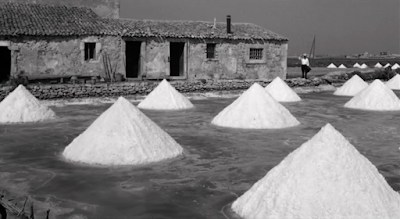Happy New Year!
1. High and Low (Akira Kurosawa, Japan, 1963) - begins as a simple ethical thriller about a kidnapping, transforms into a detail-heavy police procedural and a film-noir descent into Japan's underbelly. Has the character depth, thematic complexity and moral weight of a great novel, told through Akira Kurosawa's elegant filmmaking brilliance. I've only seen it once but already hold it among the greatest movies I've ever seen.
2. I Fidanzati (Ermanno Olmi, Italy, 1963)
3. Il Posto (Ermanno Olmi, Italy, 1961)
4. Time Stood Still (Ermanno Olmi, Italy, 1959) - #2 to 4 are all by the same director, Ermanno Olmi. In I Fidanzati, a northern Italian engineer is relocated for work to Sicily, leaving behind his fiance. In Il Posto, a young man begins a "job for life" at a confusingly bureaucratic, coldly impersonal office building. In Time Stood Still, a younger and older man work a winter job at an isolated dam construction site high in the Alps. All three are quiet, short and simple, but "still waters run deep" - I am amazed by the humanity and insight that suffuse these tiny stories. Ermanno Olmi was my most treasured discovery of the year.
5. The King and the Mockingbird (Paul Grimault, France, 1980) - paradoxically, a hugely influential animated film that almost nobody has heard of (Hayao Miyazaki claims it inspired him to become an animator). Brilliantly designed and animated, dizzyingly inventive. Unlike any film I've seen before, watching it unfold was a delight.
6. Dersu Uzala (Akira Kurosawa, Japan / Russia, 1975) - another classic from Akira Kurosawa, although it's hard to believe it's from the same director as High and Low. Where High and Low is forbiddingly dense, Dersu Uzala is beautifully simple. A story of friendship and survival in the Siberian wilderness that is gorgeously filmed, wild and heartfelt.
7. The Tale of the Fox (Wladyslaw Starewicz, France, 1930) - Snow White and the Seven Dwarfs is often called the first feature-length animated movie, which is factually wrong; The Tale of the Fox was made even earlier. A brilliant stop-motion retelling of a German folktale about a trickster fox - a clever, unrepentant jerk who is, amusingly, never redeemed. The animation still looks great, the story is darkly funny, and it was an inspiration for the also-brilliant Fantastic Mr. Fox from Wes Anderson!
8. The Incredible Shrinking Man (Jack Arnold, United States, 1957) - I personally love these cheesy 1950s sci-fi movies, but The Incredible Shrinking Man is truly something special. As our protagonist shrinks from the size of a man to a child to a pin, the old-school special effects remain shockingly convincing - I loved all the massive props of everyday objects (like using a match as a torch, or a paint mixer as a bridge across the deep chasm between a dresser and a windowsill). The Incredible Shrinking Man is a work of B-movie genius, a survival adventure story set in a suburban 1950s home - where a spider in the basement becomes a towering monster and a leaky faucet creates a massive flood.
9. The Adventures of Robin Hood (Michael Curtiz, United States, 1938) - one of the greatest swashbuckling adventures ever filmed. From Errol Flynn's charming swagger to Olivia de Havilland's elegance, from the glorious technicolor to the swordfights and derring-do, The Adventures of Robin Hood is classic Hollywood at its best.
10. Mr. Thank You (Hiroshi Shimizu, Japan, 1936) - a bus travels through the Japanese countryside, driven by the well-loved 'Arigato-san', known for yelling 'arigato!' to everyone he passes on the road. Seems charmingly naive at first, populated with fond caricatures passing through Japan's lovely mountain roads. But even with its happy-go-lucky attitude, Mr. Thank You deals with some of the tough realities of depression-era Japan - many passengers are searching for work, including a disarmingly young girl who is travelling to Tokyo to, it is suggested, work as a prostitute. Yet Hiroshi Shimizu's film is unerringly kind and generous in its vision of people - one of its loveliest moments shows Arigato-san conversing with Korean immigrants travelling on foot, a discriminated-against group at the time. Mr. Thank You's gentle kindness is actually a strong, brave statement.




















No comments:
Post a Comment